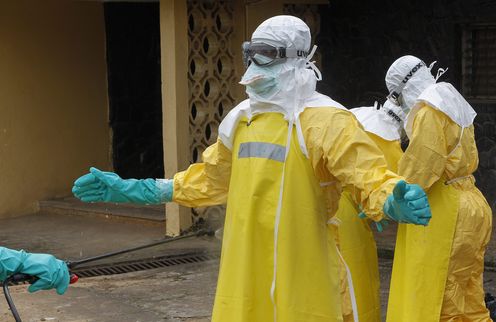
News that a 27-year-old Gold Coast man is being quarantined in hospital after returning from the Democratic Republic of Congo two days ago is no reason to panic. If anything, the incident highlights the problematic nature of the international response to the current Ebola epidemic.
Segments of the media have quickly highlighted the possibility the Australian man contracted Ebola virus disease during his time in Congo. The country is experiencing an outbreak of the haemorrhagic fever virus, but it’s separate to the one reported in West African nations of Guinea, Liberia, Sierra Leone, Senegal, and Nigeria.
The danger of such reports is that risks can get blown out of proportion and cause the spread of misinformation.
Resources and the lack of them
While the isolation of the patient is entirely in keeping with good management of people suspected of having an Ebola virus infection, we don’t yet know if he has the right symptoms or could possibly have been exposed to infection.
The most likely scenario is that this is another infectious disease, most likely malaria. Even if the tests for Ebola virus are positive, the risk of onward transmission in a country such as Australia is very low as long as stringent infection control measures are implemented within hospitals.
There’s no evidence the Ebola virus can be transmitted through the air; infection only occurs after direct contact with bodily fluids from someone who has the virus, someone who died from it, or contact with very recently contaminated environments.
The fast spread of the disease we’ve seen in Africa is a direct consequence of long-standing and growing inadequacies in access to basic health care. In particular, the shortage or inappropriate use of personal protective equipment and too few trained staff to cope with the large numbers of sick people.
The response to the Gold Coast “case” should not, then, be one of panic and fear. Rather, it should act as a warning that the world has not been and is still not doing enough for affected countries.
A different population
West Africa is in the midst of the world’s biggest outbreak of Ebola virus disease, and more people have now died since it started than in all previous outbreaks combined.
Before this year, sporadic outbreaks of the virus occurred in countries such as Uganda, with the largest affecting 400 people and causing 200 deaths. But central Africa’s experience and knowledge has translated into effective public health action.
In Uganda, laboratory samples are tested within 24 hours. On-the-ground health-care workers and the public are all trained in early recognition of the disease’s symptoms. And key workers have been supplied with mobile phone interfaces for central reporting of suspected cases.
The Ugandan president has led by example, warning against close personal contact during outbreaks. Schools and markets are closed quickly and the bodies of victims are buried by local authorities to reduce the risk of family members being infected.

This is clearly a population that’s wise to the actual risks of the Ebola virus and is educated in effective disease prevention. But a very different scenario is playing out in West Africa because the disease has never before been seen there.
Novelty, ignorance, and fear
It’s now thought the current outbreak started in Guinea in early December 2013, but cases remained unrecognised as stemming from Ebola virus and the Guinean Ministry of Health was not alerted until March 2014. By this time, 59 people had already died, and innumerable people infected.
Ease of travel from the affected regions to the Guinean capital Conakry, as well as into Liberia and Sierra Leone have helped the virus spread. And ignorance and fear of the disease have created significant setbacks in mounting an effective response.
Médecins Sans Frontières (MSF) had to suspend activities in southeast Guinea, for instance, after buildings and vehicles came under attack from locals who thought MSF brought the disease with them.
Quarantine measures and fears surrounding the spraying of disinfectant have led to protests and riots in Sierra Leone, Liberia, and Guinea. Efforts to contain the virus have been hampered by members of the community staying away from the authorities, out of fear they will be quarantined.
MSF, the World Bank, and the World Health Organization have all called for more international action. The WHO has projected over 20,000 cases occurring in the next six months and laid out a roadmap of action.
MSF has opened a 160-bed hospital in the Liberian capital Monrovia, which has already been overwhelmed with patients and a further 800 beds are urgently needed. There is clearly something we all can do about the Ebola outbreak and it doesn’t involve panicking about suspected local cases.
Sharing your luck
But even the suspected Gold Coast case has a lesson for us. Epidemics are no longer something Westerners can safely view on their television screens, while they rage in a remote corner of Africa, or another impoverished part of the world.
We live in a world that is more interconnected than ever, making any infectious outbreak like the current Ebola one necessarily international.
Rather than simply being inward-looking and fearful about imported cases, the global community now needs to channel its panic and fear into action and provide resources to the countries at the epicentre of the outbreak.
The rapid spread and high mortality that have occurred in West Africa are highly unlikely to occur in Western countries where health-care facilities, including rapid laboratory testing for reversible complications and appropriate – but not necessarily highly sophisticated – isolation and transmission precautions, are available.
That shouldn’t just make you thank your lucky stars, it should have you seek out ways to share your luck.
The authors do not work for, consult to, own shares in or receive funding from any company or organisation that would benefit from this article. They also have no relevant affiliations.
